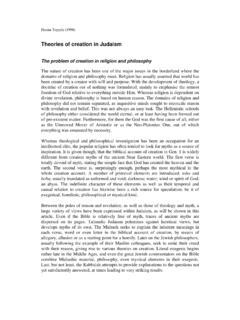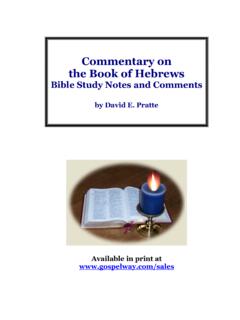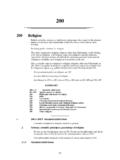Transcription of Religion, Witchcraft, and Magic - Bruce Owen
1 Introduction to Cultural Anthropology: Class 20 religion , witchcraft , and Magic Copyright Bruce Owen 2010 religion : belief and ritual concerned with supernatural beings, powers, and forces generally focuses on explaining the world and how one should live in it with reference to the supernatural supernatural: the extraordinary realm beyond, but (believed to impinge on) the observable world nonempirical must be accepted on faith some of this belief is often expressed as myths myth: a often one that explains something about the world that is usually understood to be not literally true in the physical world but to have a more profound truth often set in an ambiguous time and place usually with supernatural characters Edward Tylor developed an evolutionary scheme for religions the idea that religions evolved or progressed from earlier forms to more developed forms is no longer accepted, but the categories that Tylor used are still useful they are: animism: belief in spiritual beings, particularly that many or all things have a spirit, life, consciousness, and/or soul the animate-ness of things Tylor imagined that this began with the notion of a soul or consciousness in humans, and was generalized to all things Shinto (Japan) traditional highland Peru polytheism.
2 Belief in multiple gods Hinduism Classical Greek and Roman religions Christianity, from some points of view if saints, the hierarchy of angels, etc. are considered deities or if one considers the Father, Son, and Holy Ghost to be three deities, rather than one monotheism: belief in a single, all-powerful god Christianity (see above) Judaism Islam ( There is no God but Allah, and Mohammad is his messenger ) Tylor and most anthro texts stop with these, but we should probably add non-theism: religious belief that involves no god Buddhism Intro to Cultural Anthro S 2010 / Owen: religion , witchcraft , and Magic p. 2 mana: an impersonal force that can reside in people, animals, plants, or objects the term comes from Melanesia, but the concept is widespread mana could bring about luck or good fortune, but could also be dangerous in Melansia, you could work to gain mana in Polynesia, you had to be born into it, along with high rank fetish: an object that contains supernatural power (such as mana) which can bring good fortune, success, effectiveness, power, etc.
3 Lucky rabbit s foot St. Christopher medal: Catholic patron saint of travelers taboo: a prohibition for supernatural reasons contact between Polynesian chiefs and commoners was taboo, forbidden in some French wine producing areas, it is taboo for women to participate in the crushing of the grapes don t walk under a any others? ritual: a kind of behavior that has many of the following features in how it is performed: it is formal, stylized repetitive, stereotyped performed at special times and places, outside normal life liturgical: it involves words and actions established in the past (a liturgy ) in earnest: participants are not playing or acting symbolic: it conveys meanings to and about the participants social (usually): participants acknowledge shared belief in something that is known to, but beyond, the group note that the concept of ritual is about the form of the behavior, not its content, purpose, or meaning how or what is done not why it is done rituals can serve many different purposes not only religious, but judicial: swearing in a witness political: inaugurating a president entertainment: starting the Olympics social.
4 Rites of passage such as marriage or graduation, and many others Magic : supernatural techniques to bring about specific ends may be part of religion , but not necessarily the distinguishing feature is that it is intended to manipulate specific forces or beings to cause a particular outcome; Magic is procedural, technical, practical typically involves spells, incantations, or other ritual actions to achieve the desired results imitative Magic : the technique resembles the desired result voodoo dolls house and field models on Cerro Ba l Intro to Cultural Anthro S 2010 / Owen: religion , witchcraft , and Magic p. 3 contagious Magic : the technique uses an object connected to the person or thing to be affected in some societies, people are careful to collect their cut hair and fingernail clippings and hide or destroy them so that no one can use them for contagious Magic against the person witchcraft : actions of a person that supernaturally cause harm to someone else this common anthropological use of the term is different from how it is used in some other contexts Wiccans use the term witchcraft for the practice of Magic , both for good and ill The Azande version (just one variant of many), famously documented by Sir E.
5 E. (Edward Evan) Evans-Pritchard witches have a physical organ that has this power it is inherited, like other physical traits the witch may not know he/she is a witch the witch may not know that he/she is harming someone the witch can only partially control his/her own witchcraft Witches may be identified using the poison oracle a shaman gives a poison brew to a chicken; if it dies, that signifies one answer, if it survives, that signifies another witchcraft does not defy natural forces, it just arranges natural events in harmful ways witchcraft by witches explains the confluence of natural events that causes harm to a particular person Why was anyone harmed, and why this particular person? witchcraft brings a man into relation with events in such a way that he sustains injury witchcraft is the second spear But it does NOT cause events controlled by a person s will Lies, adultery, murder of a tribesman Example: people sitting under a storage silo that collapses Azande know that these silos collapse, due to natural decay of the wooden posts but why did it collapse just then, when those particular people were under it?
6 Example: Why a skilled potter s pots crack, when he is doing the same thing as he always does Example: Why a walker stubs his toe and it gets infected, even though he is always vigilant and wounds usually heal quickly theories about why people do all this: possible functions of religion and Magic Intellectual/cognitive function: Edward Tylor, Edward Evans-Pritchard, and others felt that religion served to explain the inexplicable Kottak suggests that it must be doing more than that for us, since science now explains so much, but religion still thrives I suggest that there is still a lot that science cannot explain, but religion can love, death, what might happen after death, good, evil the origin of the universe Intro to Cultural Anthro S 2010 / Owen: religion , witchcraft , and Magic p. 4 the meaning and purpose of life and even what science can explain is not really understood by many non-scientists so for many, science does not replace religion , but rather is just another alternative type of religion emotional/psychological function: Malinowski felt that religion and Magic satisfy emotional or psychological needs Magic : gives a feeling of control over the unpredictable and uncontrollable, reducing anxiety religion : provides comfort in the face of existential crises, including death, illness, injuries, birth, puberty, marriage social function: Emile Durkheim, Marx, and many others have suggested that religion has social functions creates group identity and cohesion (social solidarity.)
7 Durkheim) religion has a social function in creating this solidarity, which helps the society handle crises and threats promises of supernatural rewards and threats of supernatural sanctions encourage people to behave in ways that lead to success of the group maintain peaceful, productive social relations fulfill their roles in society however, plenty of religions (about 25% in one study) do not involve supernatural rewards or sanctions for following or violating moral rules so this function, at least, is not universal it can be hard to draw a line between belief based on faith and referring to the supernatural ( religion ), and belief that is thought to be empirical or not related to the supernatural does mana relate to something thought to be supernatural, or is it thought to be part of the natural world? would the Azande consider the existence of witches to be based on faith, or a fact of the physical world?
8 How is an average American s scientific belief in the big bang different from a religious belief in supernatural creation? how is belief in microbes that experts tell you exist different from belief in Azande witches that experts tell them exist? Next time we will consider where such beliefs come from Gmelch: Baseball Magic Magic does not only occur in strange, foreign cultures; Americans do it, too some kinds of alternative medicine that have no clinical support fetishes for luck, phrases for luck, taboos for what baseball players do that is Magic : develop and follow a daily routine rituals Gmelch s somewhat odd definition of ritual: prescribed behaviors in which there is no empirical connection between the means and the desired end most anthropologists would use this as a definition of Intro to Cultural Anthro S 2010 / Owen: religion , witchcraft , and Magic p. 5 Magic in general describes the purpose of the behavior: it is intended to achieve a specific end by non-physical means not ritual describes the nature of the behavior itself When Gmelch actually uses the term ritual, he seems to be using the more standard definition of ritual that we looked at earlier today: a kind of behavior that has many of the following features in how it is performed: it is formal, stylized repetitive, stereotyped performed at special times and places, outside normal life liturgical in earnest symbolic social (although many baseball rituals are private, not social) baseball rituals develop out of unusual actions associated with good performances if a player repeats the unusual action and has another success, the connection seems proved, and he keeps doing it when he has a bad game or two, he stops doing the ritual because it isn t working example.
9 Rally cap taboos (prohibitions) usually develop out of unusually bad performances don t say no-hitter fetishes: material objects that contain luck (mana) may be associated with the start of a good streak lucky glove, socks, jersey, a round stone, etc. why do baseball players do all these things? in general, it is comforting, helps concentration but also more specifically, players clearly think of it as effective at causing a desired result: that is, Magic Gmelch argues that this Magic is meant to control chance and uncertainty Malinowski on Trobriand Islanders Magic serves to give a sense of control where ordinary means cannot do so fishing in the inner lagoon was safe and reliably produced a catch little Magic used fishing on the open sea was dangerous and the outcome was very variable lots of magical ritual used in baseball pitching and hitting are strongly affected by luck outcomes vary widely and seem beyond the player s control even the best batters only hit once in three at-bats fielding is controlled more by the player s skill Intro to Cultural Anthro S 2010 / Owen: religion , witchcraft , and Magic p.
10 6 and why not practice Magic ? These baseball Magic rituals don t cost much to do, so you might as well, just in even a small gain in calm and confidence would be worth it Gmelch suggests that Magic beliefs start randomly, from whatever is noticed when a good or bad outcome occurs analogy to Skinner s pigeons given food every 15 seconds 10 seconds after last pellet, they start doing whatever action they associate with getting food quick to develop these associations, very slow to give up on them when they do not work and why not? it often works, and doesn t cost much







